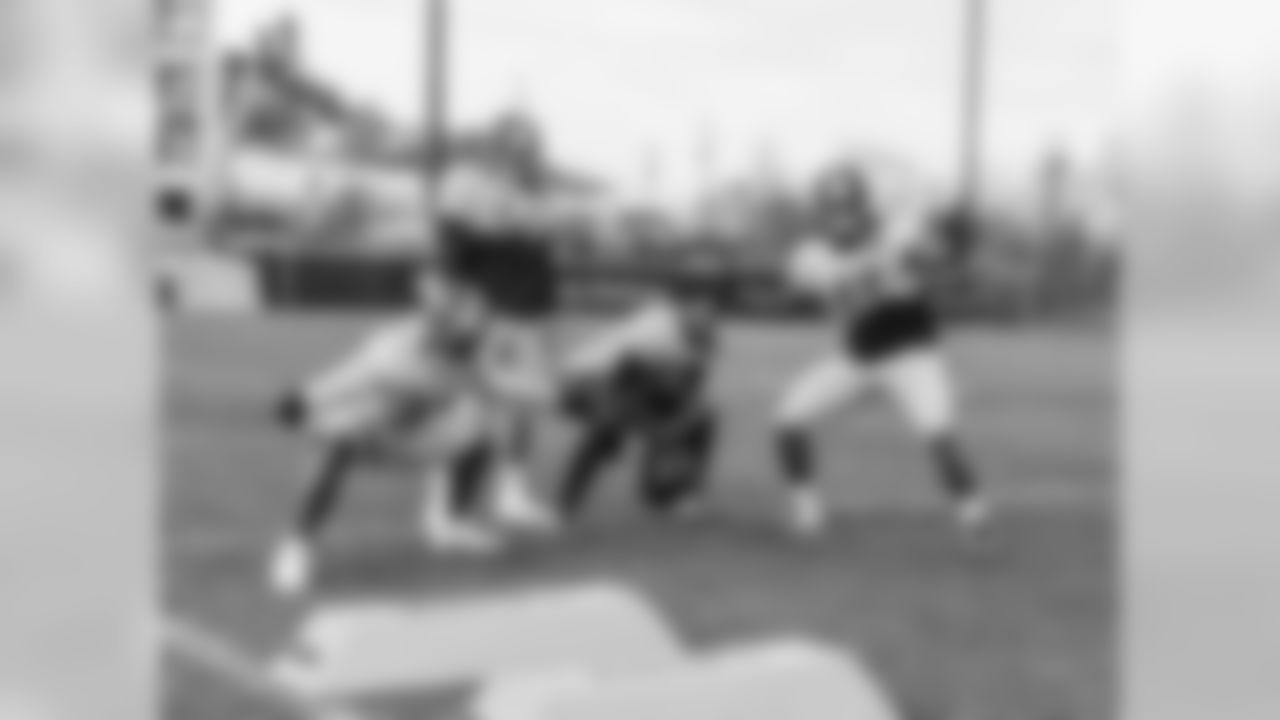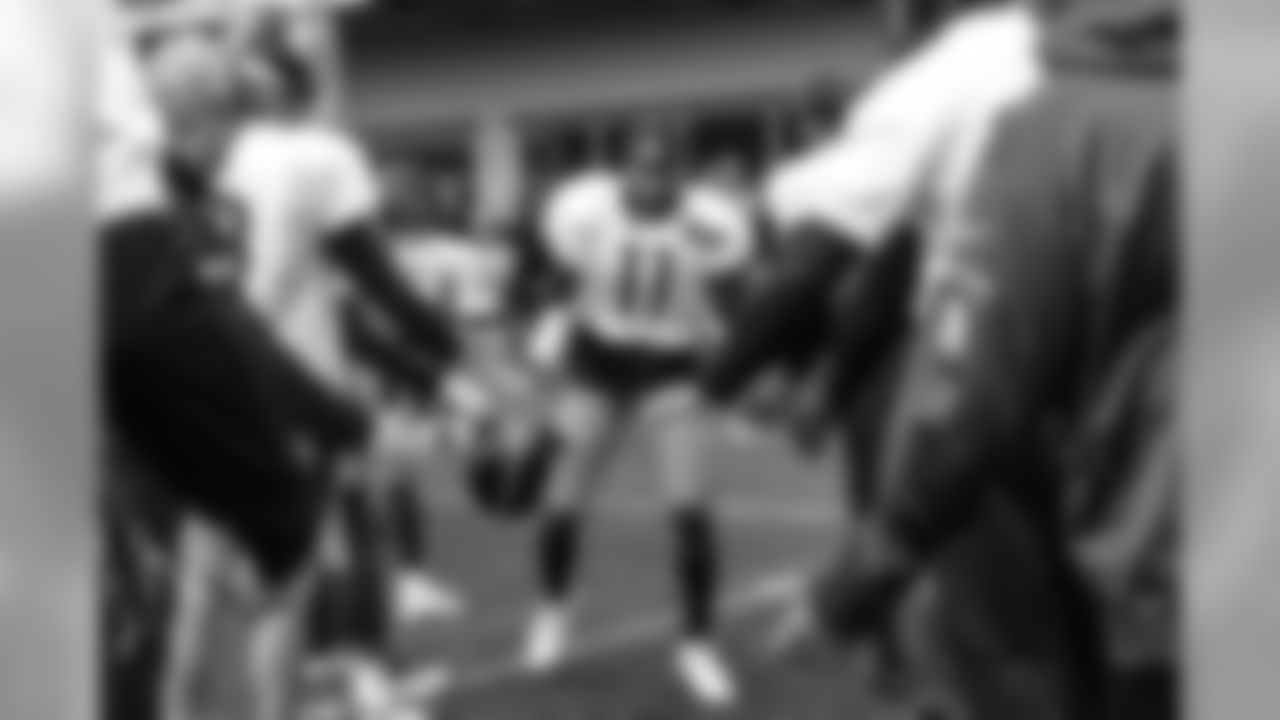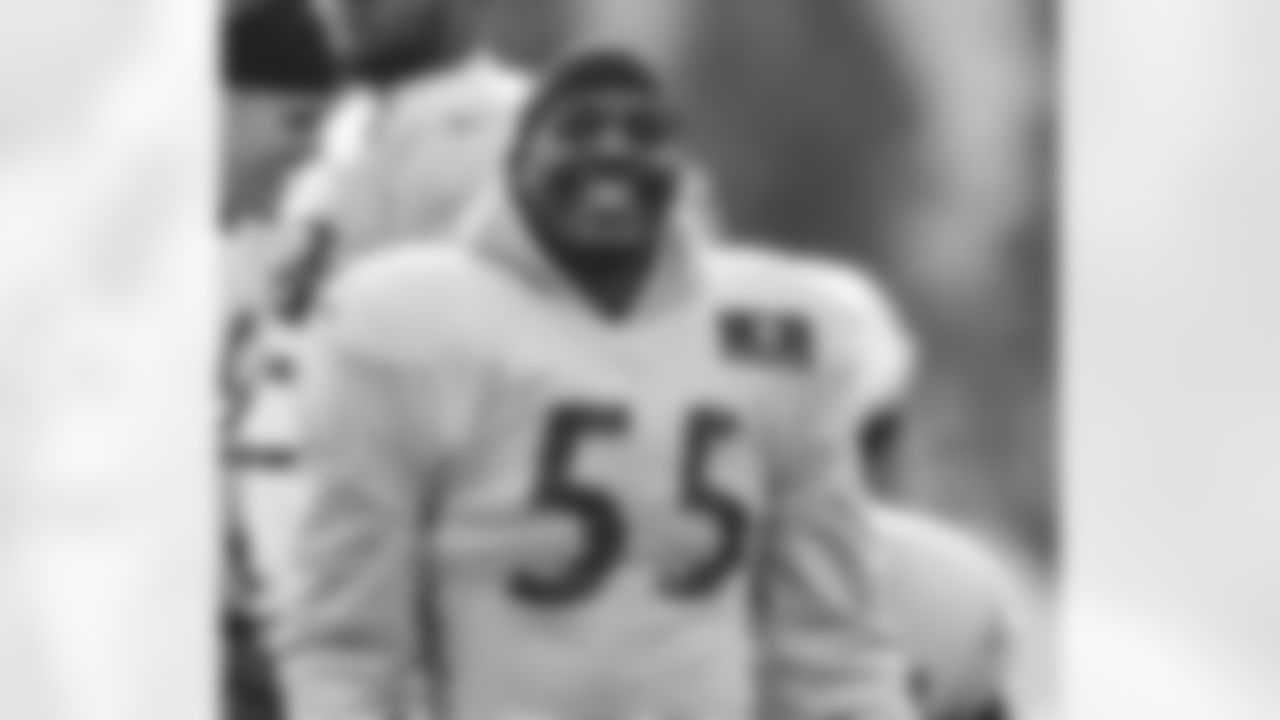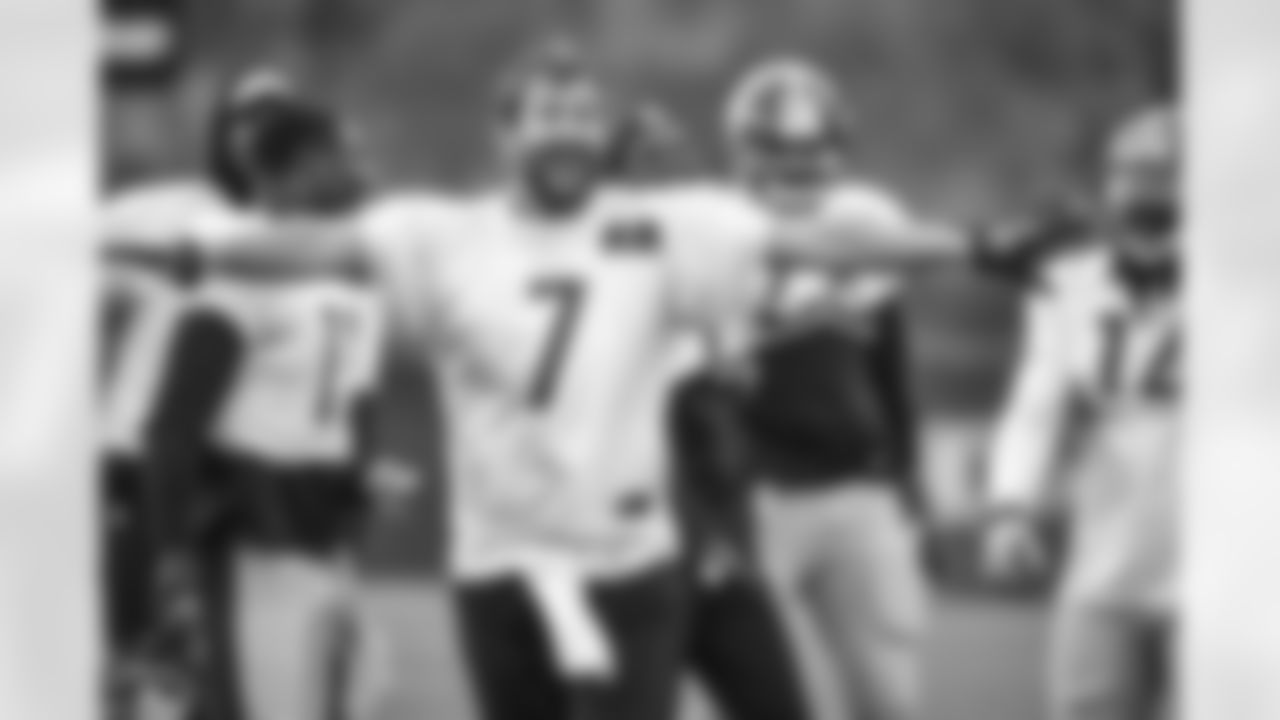Let's get to it:
DAVE ROMINE FROM NARBERTH, PA:
The Steelers have four injured quarterbacks. How about trading Dri Archer to the Patriots for a healthy Tom Brady as an extra backup? The Patriots need a running back. Or is this not allowed with Archer on the practice squad?
**
Good plan. I'll bring this to Kevin Colbert right away.**
LEE CHAMPION FROM HONOLULU, HI:
There's a lot of backup quarterback talk, but Michael Vick seems to have fallen off the radar. I know he has a hamstring pull, but have heard nothing more than that. What Intel do you have on his expected return?
Mike Vick was a healthy inactive for the game against the Browns at Heinz Field. Based on the way Coach Mike Tomlin is deploying the quarterbacks, Vick currently is No. 3 on the depth chart behind Landry Jones and his trusty backup, Ben Roethlisberger.
DAMIAN BORST FROM JEFFERSON, LA:
What is the current status of Michael Vick? And based on his play any chance the Steelers will replace him this season?
As mentioned in the previous answer, Mike Vick is healthy enough to practice, and therefore I am assuming he is healthy enough to play. As to the second part of your question, I will answer with a question of my own: replace him with whom? Whatever you may think of the way Vick played for the Steelers so far this season, he is 2-1 as a starter, and his only interception came on an end-of-the-first-half Hail Mary in San Diego. Me personally, I would be more confident in having to put Vick into a game than any other quarterback who might be available between now and the end of this season.
ROBERT ELLIS FROM MEMPHIS, TN:
The AFC could quite possibly have a division winner with a lesser record than both Wild Cards qualifiers. Do you see the NFL ever considering the re-seeding of teams for the playoffs in cases like this?
No. My sense is the majority of the owners believe in keeping the playoff incentive for a team that wins its division championship, and we have to understand how rare and cyclical such situations are, in terms of teams with sub-.500 records winning division titles. In 2010, Seattle won the NFC West on tiebreakers over the St. Louis Rams during a season in which both teams finished 7-9, and so the NFC West was decried as a bad division. By the 2012 season, the NFC West had two teams – San Francisco and Seattle – with double-digit victories, and in 2013 the Arizona Cardinals finished third in the NFC West at 10-6. San Francisco won the NFC Championship after the 2012 season, and Seattle won the Super Bowl to cap the 2013 season. Last year, the Carolina Panthers won the NFC South with a 7-8-1 record, and so we kept hearing how that division stinks. In 2015, the Panthers are one of only two undefeated teams left, and it's legitimate to make the case that Carolina is the best team in the NFC right now.
Each team has a chance to win its division championship, and winning your division is the only guaranteed path into the playoffs. Win the division, and you deserve to be in the playoffs and get the perk of playing your first postseason game at home, in my opinion. If you don't win your division, then you get thrown in with the rest into the competition for two Wild Card spots and risk suffering the consequences of tiebreakers, and you also have to go on the road.
RICK TALDA FROM DAYTON, OH:
I know that players and coaches are discouraged from making predictions and insulting the next opponent for fear that they are only providing fodder and incentive for the other team. Last week many Steelers announcers were talking about how bad the Browns run defense was, that DeAngelo Williams would run for 150 yards, etc. Do you think that those statements motivated the Browns to play so well on run defense?
**
When you refer to Steelers announcers, I believe you actually mean media members who cover the Steelers for the media outlets, and what they were saying about the Browns run defense – me included – could be verified by NFL statistics. Going into the Steelers' game, the Browns run defense was ranked at the bottom of the NFL, and of their nine opponents to that point, only San Diego had failed to rush for at least 100 yards against them, and the Chargers got 91.**
I believe the Browns' defensive plan for the Steelers was to load up against the run and force Landry Jones to beat them with the pass. That worked through the first two series, because DeAngelo Williams carried three time for minus-2 yards, and the Steelers went four-and-out on the first possession, and three-and-out on the second possession. But after Jones was injured and replaced by Ben Roethlisberger, the Browns stuck with the same defensive plan, and it blew up in their faces. Roethlisberger passed for 379 yards and three touchdowns, and by the time the Steelers got around to running the ball again, it was 30-9.
MICHAEL DE'SHAZER FROM MEMPHIS, TN:
I have a statement that I would love for you to use about the coaching job that Mike Tomlin is doing. With all the missing parts, we still find our team in the playoff picture. Look at the Cowboys. We've been without the best center in the NFL; without our first-team All-Pro running back; without our young receiver at the beginning of the season; and Tomlin found a way to piece together wins. Also, we have a new defensive coordinator. The Cowboys were supposed to be contending for the Super Bowl. We lost a lot of key people but found a way to keep winning. Please bring this up.
Consider it done. But to some, all of that isn't as important as clock management.
BRYAN HACKETT FROM SANTA CRUZ, CA:
I thought Coach Mike Tomlin had "outlawed" flips into the end zone a couple of years back. Then last week, Antonio Brown does a somersault into the end zone on a long pass play. Afterwards Tomlin apparently came out and said he was "OK with it." What gives? The last thing we need this year, or any other year, is an unnecessary injury to a star player. Isn't it the coach's job to implement this kind of discipline?
Here is an excerpt from an interview I did with Mike Tomlin on the Friday before the game against the Browns, and it deals with this issue of players' celebrations and fans expectations of the head coach in those situations:
Q. Fans want the coach to be angry at players who celebrate big hits or big plays, fans view that as a lack of discipline. What is your take on all that?
A. It just depends on the circumstance. You can't paint with a broad brush. Sometimes you have to understand the circumstances of the moment. Often times a fan's perspective depends on whether they like that player or not. And that's the reality of it. I've seen a lot of amnesty given to guys who don't deserve it because they're likeable.
Q. Where is your line drawn with this kind of stuff?
A. On game day, it's time to play. I teach and evaluate and critique on Monday. That's always my mentality. You'll never see an overreaction from me regarding anything of that nature on game day because I respect the fact those guys have to play.
I imagine there was more of a conversation between Brown and Tomlin at some subsequent time, and I'm betting it entailed more than the coach saying he was OK with it. But ever since Tomlin was hired in 2007, those kinds of conversations have been kept between him and the player, and so there might not be anything about it ever revealed publicly.
MICKI ANDERSEN FROM KOLDING, DENMARK:
I have wondered how the waiver system works. Lets take Jacoby Jones, who the Steelers claimed off waivers. How does this work? Is it the NFL who calls the teams to say this player is now available, do you want him? Or is it the former team who does something like that?
I'm going to make an attempt at explaining this without becoming overly technical.
Waivers is a system that allows teams with bad records to have first crack at claiming players who have been cut in an effort to enhance parity throughout the NFL, much in the same way an NFL Draft order is determined, with the teams with bad records picking first. That's the general idea behind waivers.
Now, onto some of the particulars: Before the trade deadline, which for the 2015 season was Tuesday, Nov. 3, players with fewer than four years in the NFL are subject to waivers, with all other "vested veteran players" simply released and free to sign with any team interested in them. After the trading deadline, again Nov. 3, 2015 this year, all players are subject to waivers to limit any possible hanky-panky between teams during the run-up to the playoffs.
In the case of Jacoby Jones: he was cut by the Chargers after 4 p.m. on Nov. 3, which meant his release came after the trade deadline expired, and therefore he was subject to waivers even though he is an eight-year veteran NFL player. Since it was after the trading deadline, teams interested in Jones had to submit a waiver claim to the NFL office, and after 24 hours the league gathered all of the claims made on Jones and awarded him to the claiming team with the worst record. On the evening of Nov. 3, the Steelers were 4-4. It's unknown which other teams might have put in a claim for Jones, but since he was awarded to the Steelers, none of those teams had a worse record than 4-4.
**
The Steelers prepare for the week 12 matchup against the Seattle Seahawks.










































Until the trading deadline, the waiver system uses records from the previous season. I am going to provide a hypothetical example to explain how this works: It's Oct. 1 and the Steelers cut a player with fewer than four NFL seasons, which means that player is subject to waivers. Let's call him Timmy Smith. Smith is subject to waivers, but because it's before the trade deadline, waivers at that point in the season use the previous year's record to determine teams' priorities, and so Tampa Bay – at 2-14 in 2014 – would've had first crack at Timmy.**
On a daily basis, the NFL will send an email to all teams – and since teams have until 4 p.m. to make roster moves on a particular day – that email arrives some time after 4 p.m. In the email is a list of all players released that day, and whether any or all of them are subject to waivers. If you work for a team interested in one of those players who's subject to waivers, you have 24 hours to put in a claim with the NFL. After the 24-hour period is up, the NFL looks at all of the teams that put in a claim and awards the player to the team with the worst record. If no team has made a claim, then the player is free to sign with anyone interested in his services.
PETER KATEGIANNIS FROM ONTARIO, CANADA:
I have noticed that some players are listed as DNP for the week and the reason given is 'not injury related,' or words to that effect. I'm sure there are a myriad of reasons for this, but I'm confused as to why this is listed this way?
Each NFL team is required to file a practice report for each of its three main practice days leading up to a game. For a Sunday game, that typically would be Wednesday, Thursday, and Friday; for a Monday game, it's typically Thursday, Friday, and Saturday. If a player doesn't participate in practice, or is limited in a practice, a reason must be given for why he didn't participate, or why his participation was limited. Usually, that reason is an injury, but there are teams, such as the Steelers, that give players an occasional day off to reduce the wear and tear on their bodies. Coach Mike Tomlin is one who awards the occasional veteran's days off to his thirtysomething players, and so if Heath Miller, for example, doesn't practice on a Wednesday because Tomlin gave him the day off, the reason listed is "not injury related."
JAKE CANTER FROM HERMITAGE, PA:
Was Dri Archer signed to the practice squad? It doesn't seem like Jacoby Jones is much better then Archer, so why did this transaction ever occur?
After he was waived by the Steelers, Dri Archer reportedly was contacted by 10 teams – including the Steelers – about signing to their practice squads. Archer refused all of those offers, and while he recently had a workout with the New York Jets, he was not on an NFL roster as of the close of business on Wednesday, Nov. 18. According to Mike Tomlin, the Jones-for-Archer move "really wasn't about Dri Archer. It was about the opportunity to acquire a guy with the pedigree of Jacoby Jones. He has been in the league since 2008, and he has nine kick returns for touchdowns – four on punts and five on kickoffs. He has done it on big stages. He went 108 (yards for a touchdown) in the Super Bowl. Anytime you have an opportunity to add a guy like that to your group, a guy you have knowledge of and believe would be a good fit, you do it."
So far, the acquisition of Jacoby Jones hasn't had an impact on the Steelers' return game, but Jones has had an impact as an NFL returner. Archer never did, and with a team in the playoff hunt where a special teams touchdown could be the difference between winning and losing, that's a reason why a coach would make such a move.
ELAINE NORDLUND FROM LATROBE, PA:
What good does it do when NFL officials admit they blew a call on the field when that admission doesn't change who won or lost a game?
To be completely clear, it's never the official himself who admits he made a mistake. It's the league acknowledging an official made a mistake. In terms of the final outcome, you are correct, it does absolutely no good. But as my grandma always preached, honesty is the best policy, and maybe the NFL thinks this "full disclosure" somehow makes the league look better.
BILL FAIR FROM HAGERSTOWN, MD:
With Le'Veon Bell on injured reserve, the Steelers are obviously thin when it comes to veteran depth at the running back position. I know DeAngelo Williams is the starting running back right now, but a veteran No. 2 would be helpful if the Steelers plan to make a deep playoff run down the stretch. Why haven't they reached out to Ray Rice? He is a proven back who could fit well into their offensive scheme.
And another great idea. I'll bring this to Kevin Colbert as soon as he's finished working out the details on that Dri Archer for Tom Brady trade.













